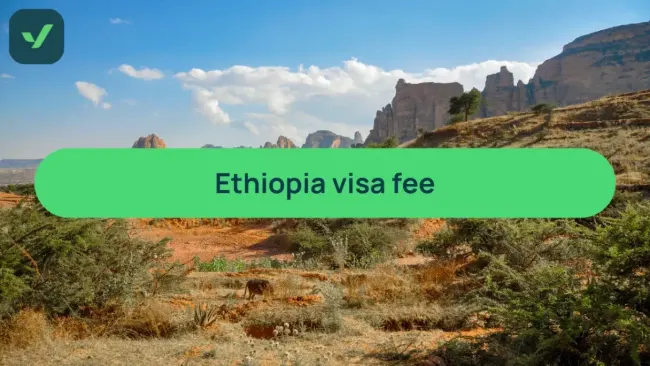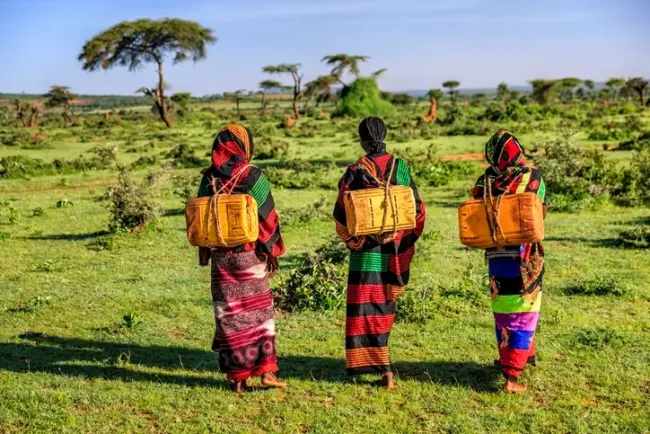
Ethiopia
Welcome to Ethiopia
Traveling to Ethiopia? You may need a visa – find out if you do, which type, and how to apply so you can get the paperwork out of the way and focus on your trip.

What's an Ethiopia eVisa, and who's it for?
Who's the Ethiopia eVisa for?
Visitors from all over the world.
Who's not eligible for the Ethiopia eVisa?
People from the following two countries don't have to apply for this visa to visit the country:
-
Kenya
-
Djibouti
Note that this info can sometimes change, so it's always a good idea to double-check via our Visa Checker Tool.
What's the purpose of the Ethiopia eVisa? Visit the country for tourism.
Also, please note you can currently only use this option at the following entry point:
- Addis Ababa Bole International Airport
How long can you stay with an Ethiopia eVisa? You can use the visa for a Single entry into the country for a stay of up to 30 days in total.
What's an Ethiopia Business eVisa, and who's it for?
Who's the Ethiopia Business eVisa for?
Business travelers from all over the world.
Who's not eligible for the Ethiopia Business eVisa? People from the following two countries don't have to apply for this visa to visit the country for business:
-
Kenya
-
Djibouti
What's the purpose of the Ethiopia Business eVisa?
Conducting business activities and work of any kind, including voluntary work.
How long can you stay with an Ethiopia Business eVisa?
You can use this visa for a Single entry into the country for a stay of up to 30 days per entry.
What's an Ethiopia Visa on Arrival, and who's it for?

Who's the Ethiopia Visa on Arrival for? Nationals from certain countries and territories, or individuals holding residence permits from these areas, can get a tourist visa upon arrival at Addis Ababa Bole International Airport, including African Union nationals and all European Union citizens. Check the full requirements through our Visa Checker Tool.
What's the purpose of the Ethiopia Visa on Arrival? This visa only allows you to do tourist activities.
How long can you stay with an Ethiopia Visa on Arrival?
This tourist visa is valid for stays of up to 3 months.
For more information on how to get a Visa on Arrival, check with your airline or the nearest Ethiopian Embassy or Consulate.
What's an Ethiopia Transit Visa, and who's it for?
Who's the Ethiopia Transit Visa for? This visa is available for almost all travelers except those from Kenya and Djibouti, who are visa-exempt.
Who isn't eligible for the Ethiopia Transit Visa? If you're transiting through Addis Ababa Bole International Airport and staying within the airport for a connecting flight, you don't need a transit visa.
What's the purpose of the Ethiopia Transit Visa? Enter Ethiopia, typically for a brief layover, before continuing their journey to another destination.
How long can you stay with an Ethiopia Transit Visa? The transit visa allows you to stay in the country for up to 12 hours.
At iVisa, we currently don't offer the Transit Visa. For more information on how to apply, contact the nearest Ethiopian Embassy or Consulate.
What are the Ethiopia long-term visa options?

Ethiopia offers several long-term visa options for various purposes, such as employment, study, business, and residence. Here are some of the common long-term visas:
-
Journalism Visa: A visa for journalists and media personnel traveling to Ethiopia for reporting purposes.
-
Student Visa: For foreign nationals enrolled in educational institutions in Ethiopia.
-
Conference Visa: Issued to attendees of conferences and events held in Ethiopia.
-
Investment Visa: For individuals investing in Ethiopia's economy.
-
Foreign Business Firm Employment Visa: Allows foreign business firms to employ staff in Ethiopia.
-
Ethiopian Government Employment Visa: For foreign nationals working in Ethiopian government positions.
-
Ethiopian Private Business Firm Work Visa: Enables foreign employees of private Ethiopian businesses.
-
International Organizations/Embassies Work Visa: For employees of international organizations or embassies based in Ethiopia.
-
Ethiopian Government Institutions Short Task Visa - GIV: Short-term visa for tasks in Ethiopian government institutions.
-
Non-Governmental Organizations (NGO) Work Visa: Allows individuals to work for NGOs in Ethiopia.
At iVisa, we currently don't offer long-term visas for Ethiopia. For more information on how to apply, contact the Ethiopian Embassy or Consulate.
Staying healthy in Ethiopia: Here's what you need to know
Healthcare facilities and standards in Ethiopia can vary depending on the location and the type of facility. Here's what travelers should know.
Make sure to stay updated on routine vaccines
-
Typically, recommended vaccines include measles, mumps and rubella (MMR), Hepatitis A, and typhoid.
-
A yellow fever vaccination certificate is required for travelers arriving from countries with a risk of yellow fever transmission.
-
Keep updated with Ethiopia's COVID-19 requirements, such as quarantine, testing, or vaccine certificates, through your airline or the Ethiopian government website.
Medical facilities
-
In major cities like Addis Ababa, you can find modern healthcare facilities and hospitals offering a range of medical services.
-
In remote and rural areas, health facilities are limited and may have different equipment levels or availability of specialized care.
-
It's advisable to purchase medicines from reputable pharmacies, preferably those attached to hospitals or larger medical centers.
Health insurance
We recommend taking out health insurance before you travel anywhere from any destination.
Contact your insurance provider before traveling to ensure you have the right level of coverage.
Other things to consider:
-
Trip cancellation, delay, and interruption benefits.
-
Medical expenses and medical evacuation benefits.
-
Baggage coverage.
Things to be aware of when visiting Ethiopia
Keep an extra eye on the following to keep healthy and safe during your trip to Ethiopia:
1. Food and waterborne illnesses: Be cautious when eating street food. Ensure food is well-cooked and served hot to reduce the risk of foodborne illnesses. Stick to bottled water.
2. Altitude sickness: If your travel plans include high-altitude areas, be aware of the risk of altitude sickness. Ascend gradually, stay hydrated, and know the symptoms of altitude sickness.
3. Mosquitos: In malaria-risk areas, use insect repellent, wear long sleeves and pants, and sleep under insecticide-treated bed nets to reduce the risk of mosquito-borne diseases.
Medication for personal use
Follow these tips to bring into Ethiopia some over-the-counter medicines:
-
Declare all medications: Report all medicines for personal use to customs authorities.
-
Original packaging: Always keep medicines in their original containers and transparent bags in your hand luggage.
-
Prescription or doctor's letter: Present the medical prescription issued by your doctor or other competent authority in English.
-
Check for restrictions: Call Ethiopia's embassy to verify that all of your prescription(s) are legal to bring with you.
-
Quantity aligned with itinerary: Bring only a reasonable quantity that aligns with the duration of your stay to avoid complications.

 Australia ETA Online
Australia ETA Online
 United Kingdom ETA
United Kingdom ETA
 India Tourist eVisa
India Tourist eVisa
 Canada ETA Visa
Canada ETA Visa
 Turkey eVisa
Turkey eVisa
 Egypt eVisa
Egypt eVisa
 Singapore SG Arrival Card
Singapore SG Arrival Card
 Indonesia eVoa Visa
Indonesia eVoa Visa
 Aruba ED Card
Aruba ED Card


